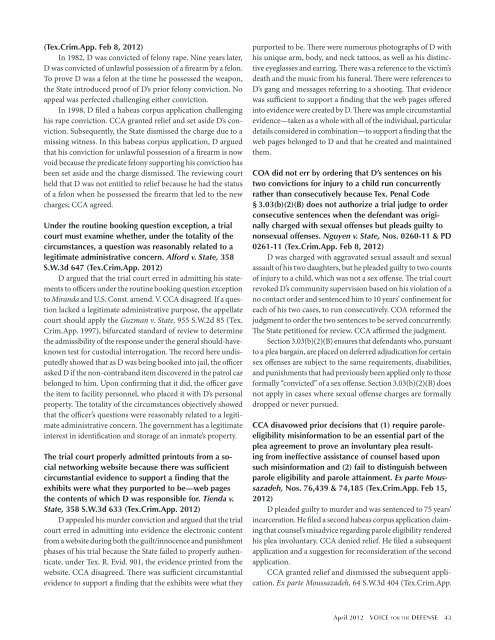for the defense for the defense - Voice For The Defense Online
for the defense for the defense - Voice For The Defense Online
for the defense for the defense - Voice For The Defense Online
You also want an ePaper? Increase the reach of your titles
YUMPU automatically turns print PDFs into web optimized ePapers that Google loves.
(Tex.Crim.App. Feb 8, 2012)In 1982, D was convicted of felony rape. Nine years later,D was convicted of unlawful possession of a firearm by a felon.To prove D was a felon at <strong>the</strong> time he possessed <strong>the</strong> weapon,<strong>the</strong> State introduced proof of D’s prior felony conviction. Noappeal was perfected challenging ei<strong>the</strong>r conviction.In 1998, D filed a habeas corpus application challenginghis rape conviction. CCA granted relief and set aside D’s conviction.Subsequently, <strong>the</strong> State dismissed <strong>the</strong> charge due to amissing witness. In this habeas corpus application, D arguedthat his conviction <strong>for</strong> unlawful possession of a firearm is nowvoid because <strong>the</strong> predicate felony supporting his conviction hasbeen set aside and <strong>the</strong> charge dismissed. <strong>The</strong> reviewing cour<strong>the</strong>ld that D was not entitled to relief because he had <strong>the</strong> statusof a felon when he possessed <strong>the</strong> firearm that led to <strong>the</strong> newcharges; CCA agreed.Under <strong>the</strong> routine booking question exception, a trialcourt must examine whe<strong>the</strong>r, under <strong>the</strong> totality of <strong>the</strong>circumstances, a question was reasonably related to alegitimate administrative concern. Al<strong>for</strong>d v. State, 358S.W.3d 647 (Tex.Crim.App. 2012)D argued that <strong>the</strong> trial court erred in admitting his statementsto officers under <strong>the</strong> routine booking question exceptionto Miranda and U.S. Const. amend. V. CCA disagreed. If a questionlacked a legitimate administrative purpose, <strong>the</strong> appellatecourt should apply <strong>the</strong> Guzman v. State, 955 S.W.2d 85 (Tex.Crim.App. 1997), bifurcated standard of review to determine<strong>the</strong> admissibility of <strong>the</strong> response under <strong>the</strong> general should-haveknowntest <strong>for</strong> custodial interrogation. <strong>The</strong> record here undisputedlyshowed that as D was being booked into jail, <strong>the</strong> officerasked D if <strong>the</strong> non-contraband item discovered in <strong>the</strong> patrol carbelonged to him. Upon confirming that it did, <strong>the</strong> officer gave<strong>the</strong> item to facility personnel, who placed it with D’s personalproperty. <strong>The</strong> totality of <strong>the</strong> circumstances objectively showedthat <strong>the</strong> officer’s questions were reasonably related to a legitimateadministrative concern. <strong>The</strong> government has a legitimateinterest in identification and storage of an inmate’s property.<strong>The</strong> trial court properly admitted printouts from a socialnetworking website because <strong>the</strong>re was sufficientcircumstantial evidence to support a finding that <strong>the</strong>exhibits were what <strong>the</strong>y purported to be—web pages<strong>the</strong> contents of which D was responsible <strong>for</strong>. Tienda v.State, 358 S.W.3d 633 (Tex.Crim.App. 2012)D appealed his murder conviction and argued that <strong>the</strong> trialcourt erred in admitting into evidence <strong>the</strong> electronic contentfrom a website during both <strong>the</strong> guilt/innocence and punishmentphases of his trial because <strong>the</strong> State failed to properly au<strong>the</strong>nticate,under Tex. R. Evid. 901, <strong>the</strong> evidence printed from <strong>the</strong>website. CCA disagreed. <strong>The</strong>re was sufficient circumstantialevidence to support a finding that <strong>the</strong> exhibits were what <strong>the</strong>ypurported to be. <strong>The</strong>re were numerous photographs of D withhis unique arm, body, and neck tattoos, as well as his distinctiveeyeglasses and earring. <strong>The</strong>re was a reference to <strong>the</strong> victim’sdeath and <strong>the</strong> music from his funeral. <strong>The</strong>re were references toD’s gang and messages referring to a shooting. That evidencewas sufficient to support a finding that <strong>the</strong> web pages offeredinto evidence were created by D. <strong>The</strong>re was ample circumstantialevidence—taken as a whole with all of <strong>the</strong> individual, particulardetails considered in combination—to support a finding that <strong>the</strong>web pages belonged to D and that he created and maintained<strong>the</strong>m.COA did not err by ordering that D’s sentences on histwo convictions <strong>for</strong> injury to a child run concurrentlyra<strong>the</strong>r than consecutively because Tex. Penal Code§ 3.03(b)(2)(B) does not authorize a trial judge to orderconsecutive sentences when <strong>the</strong> defendant was originallycharged with sexual offenses but pleads guilty tononsexual offenses. Nguyen v. State, Nos. 0260-11 & PD0261-11 (Tex.Crim.App. Feb 8, 2012)D was charged with aggravated sexual assault and sexualassault of his two daughters, but he pleaded guilty to two countsof injury to a child, which was not a sex offense. <strong>The</strong> trial courtrevoked D’s community supervision based on his violation of ano contact order and sentenced him to 10 years’ confinement <strong>for</strong>each of his two cases, to run consecutively. COA re<strong>for</strong>med <strong>the</strong>judgment to order <strong>the</strong> two sentences to be served concurrently.<strong>The</strong> State petitioned <strong>for</strong> review. CCA affirmed <strong>the</strong> judgment.Section 3.03(b)(2)(B) ensures that defendants who, pursuantto a plea bargain, are placed on deferred adjudication <strong>for</strong> certainsex offenses are subject to <strong>the</strong> same requirements, disabilities,and punishments that had previously been applied only to those<strong>for</strong>mally “convicted” of a sex offense. Section 3.03(b)(2)(B) doesnot apply in cases where sexual offense charges are <strong>for</strong>mallydropped or never pursued.CCA disavowed prior decisions that (1) require paroleeligibilitymisin<strong>for</strong>mation to be an essential part of <strong>the</strong>plea agreement to prove an involuntary plea resultingfrom ineffective assistance of counsel based uponsuch misin<strong>for</strong>mation and (2) fail to distinguish betweenparole eligibility and parole attainment. Ex parte Moussazadeh,Nos. 76,439 & 74,185 (Tex.Crim.App. Feb 15,2012)D pleaded guilty to murder and was sentenced to 75 years’incarceration. He filed a second habeas corpus application claimingthat counsel’s misadvice regarding parole eligibility renderedhis plea involuntary. CCA denied relief. He filed a subsequentapplication and a suggestion <strong>for</strong> reconsideration of <strong>the</strong> secondapplication.CCA granted relief and dismissed <strong>the</strong> subsequent application.Ex parte Moussazadeh, 64 S.W.3d 404 (Tex.Crim.App.
















